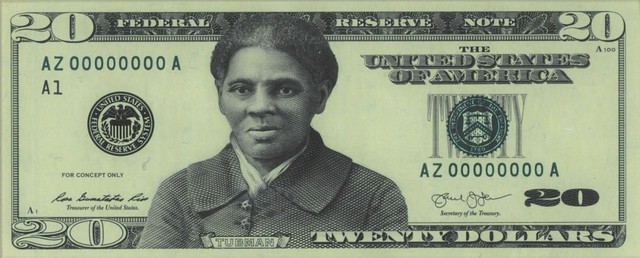
PREV ARTICLE
NEXT ARTICLE
FULL ISSUE
PREV FULL ISSUE
WHICH TUBMAN PORTRAIT TO USE?
BEP Tubman Note facsimile design Max Hensley writes: I noticed the Tubman note facsimile and immediately thought, well, shades of the Susan B. Anthony dollar! This is the second politically active female to be transformed by the government into a battle-axe and stuck on our money. Tubman's visage is a combination of glower, sneer and frown. She looks the way my grandmother did when I came home two hours late from curfew. I suppose that is the way it was in those tough times for women (and blacks), but I have always felt the harsh depictions the government foists on us are designed to punish us retroactively for our ancestors' bad behavior or to show us how hard it was for these rights pioneers. In any case, I don't want my money to be preaching at me, delivering a guilt-trip message about some identity group or another. I want it to be an uplifting and unifying message about my country. This curmudgeon writer would be happy with bills featuring scenes from the national parks or historical events like the Battle of Yorktown. Our current boring currency selection of big-headed officials and clunky buildings is bad, but let the special interests get on to our currency and it's gonna be a bad day indeed. I also thought of the Anthony dollar coin debacle, where her descendants fought for a "realistic" portrait of her in old age, as they remembered her. But a portrait of her in her prime would probably have been more appropriate as well as more aesthetically pleasing. Politics is in the eye of the beholder. I'm a political moderate and WOULD find honoring Tubman to be uplifting and unifying. I can agree with Max though that current designs are boring, and also to be wary about changing them willy-nilly. It's precisely because you can't please everyone that countries end up with bland buildings, plants and animals on their paper money. But back to the topic of WHICH portrait to prefer, should a Tubman design ever move forward. The New Yorker had a piece on the Tubman note this week, and it also touched on the chosen image of her. Thanks to Arthur Shippee for forwarding it. -Editor A leaked facsimile of the Tubman twenty, published in the Times last Friday, gives a sense of how far along the plan had been. The designers chose a familiar image, showing an older Tubman in a black coat with a prim white collar, her graying hair pulled back in what might be plaits. It is not a statesman's bloodless portrait; it does not project pomp or circumstance but, rather, a frisson of moral humility. Frail-seeming, Tubman is ever so slightly smiling. Her expression is a stealthy contrast to the blank-eyed stare of Jackson, who would remain on the new twenty's back side, demoted but not fully displaced.
To read the complete article, see:
 I can't help but keep coming back to the $100 J.S.G. Boggs bill shown above, picturing Harriet Tubman as a child. The younger Tubman portrait had yet to be found when this was produced in the 1990s; I would also prefer the midlife portrait. -Editor To read the earlier E-Sylum article, see:
Here's one more take on the topic from the Daily Kos, forwarded by Gary Beals. -Editor To nobody's surprise, the decision was viewed in some right-wing quarters as politicizing our currency. Trump himself called the decision “pure political correctness,” as if no politics have been involved in previous choices of who appears on our bills and coins. He suggested Tubman should perhaps appear on the $2 bill, currency that many Americans are surprised to learn still exists. The $2 bill does indeed still exist. Maybe a design change is the boost it needs to get into circulation. Not that it matters much what any numismatists or even plain old citizens think. -Editor To read the complete article, see:
THE BOOK BAZARREWayne Homren, Editor The Numismatic Bibliomania Society is a non-profit organization promoting numismatic literature. See our web site at coinbooks.org. To submit items for publication in The E-Sylum, write to the Editor at this address: whomren@gmail.com To subscribe go to: https://my.binhost.com/lists/listinfo/esylum All Rights Reserved. NBS Home Page Contact the NBS webmaster 
|
